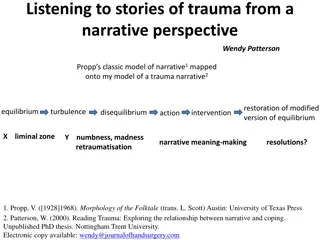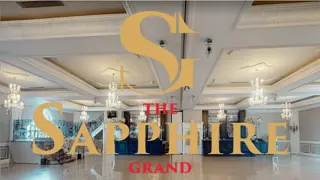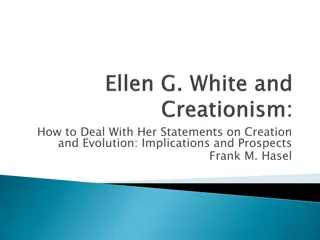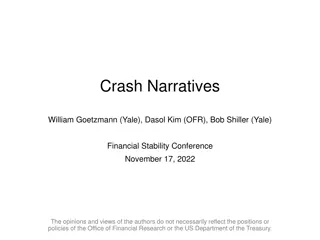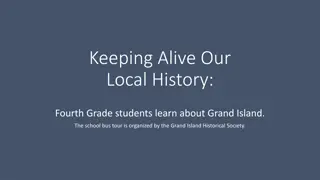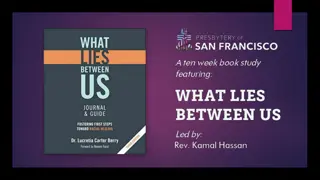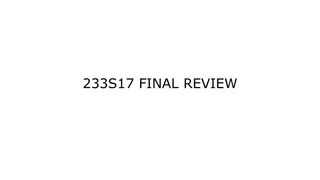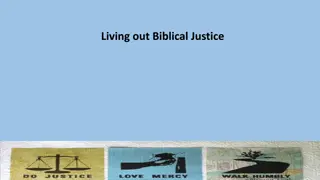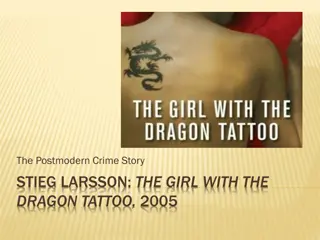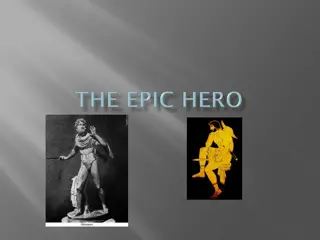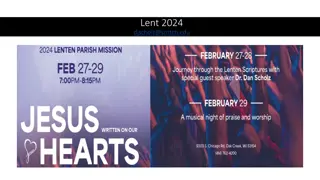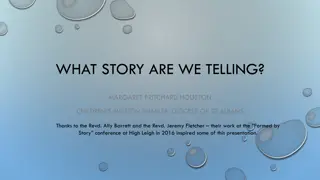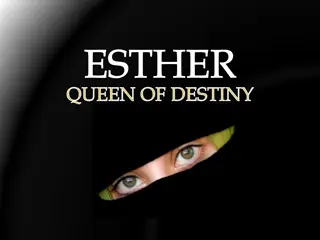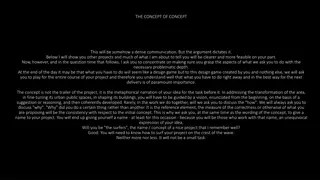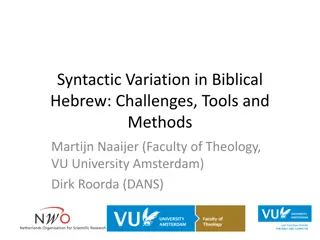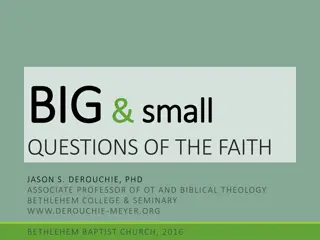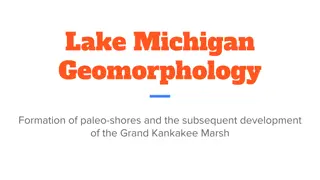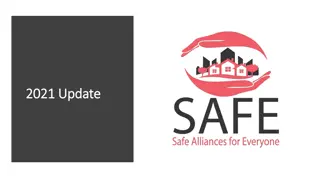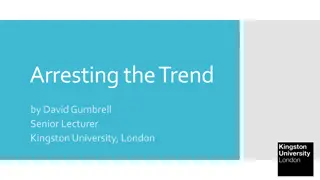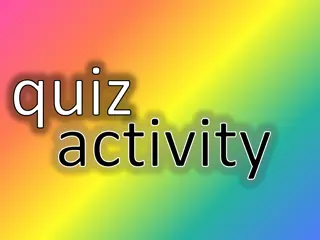Exploring Grand Narratives: Evolution vs. Biblical Creation
A thought-provoking exploration of the two contrasting grand stories shaping the Western mindset - the narrative of evolution emphasizing survival of the fittest, and the biblical account of creation and divine purpose. Dive into the complexities of these narratives and their impact on education, worldview, and human life.
Download Presentation

Please find below an Image/Link to download the presentation.
The content on the website is provided AS IS for your information and personal use only. It may not be sold, licensed, or shared on other websites without obtaining consent from the author. Download presentation by click this link. If you encounter any issues during the download, it is possible that the publisher has removed the file from their server.
E N D
Presentation Transcript
Which Story is Shaping Your College? Michael Goheen Trinity Western University Langley, B.C.
Romans 12.1-2 Therefore, I urge you, brothers, in view of God s mercy, to offer your bodies as living sacrifices, holy and pleasing to God--this is your spiritual act of worship. Do not conform any longer to the pattern of this world, but be transformed by the renewing of your mind. Then you will be able to test and approve what God s will is--his good, pleasing, and perfect will.
Three Issues Some story will shape our lives including education
Fox and the Crow A fox compliments a crow: My you have a lovely voice; won t you sing me a song? What is the meaning of this event?
Fox and the Crow The crow sits perched high in a tree with a piece of meat. There is a famine in the forest and all the animals use different strategies in an attempt to get the meat. The fox compliments the crow. It opens its mouth; the meat falls out and the fox runs away with it. Don t be deceived by flattery!
Story xxxxxxxxxxxxx Beginning Theme End Conflict/Resolution
I can only answer the question What am I to do? if I can answer the prior question Of what story do I find myself a part? -Alasdaire MacIntyre The way we understand human life depends on what conception we have of the human story. What is the real story of which my life story is a part? -Lesslie Newbigin
Grand Story Story not fictional! Normative: Public truth for all Comprehensive: True for all of life A story is the best way of talking about the way the world actually is (N.T. Wright).
Two Grand Stories in the West In our contemporary culture . . . two quite different stories are told. One is the story of evolution, of the development of species through the survival of the strong, and the story of the rise of civilization, our type of civilization, and its success in giving humankind mastery of nature. The other story is the one embodied in the Bible, the story of creation and fall, of God s election of a people to be the bearers of his purpose for humankind, and of the coming of the one in whom that purpose is to be fulfilled. These are two different and incompatible stories (Newbigin).
Two Grand Stories Cultural Story: Humanist Story (Modernity collapsing into Postmodernity) Biblical Story
A story will shape the whole educational enterprise including: Purpose of education Curriculum Pedagogy Evaluation Leadership Structures Various disciplines
Education shaped by some story . . . the issue [is] not whether education is shaped by some grand story, only which grand story will shape it.
Three Issues Some story will shape our lives including education Western story and education
Incomparably the most urgent missionary task for the next few decades is the mission to modernity ... It calls for the use of sharp intellectual tools, to probe behind the unquestioned assumptions of modernity and uncover the hidden credo which supports them... - Lesslie Newbigin
Deweys Confession First, there is a transfer of interest from the eternal and universal to what is changing and specific, concrete a movement that showed itself practically in carrying over of attention and thought from another world to this, from the supernaturalism characteristic of the Middle Ages to delight in natural science, natural activity and natural intercourse.
Deweys Confession Secondly, there is the gradual decay of authority . . . and a growing belief in the power of individual minds guided by methods of observation, experiment, and reflection, to attain the truths needed for the guidance of life.
Deweys Confession In the third place, great store is set upon the idea of progress. The future rather than the past dominates the imagination. The Golden Age lies ahead of us not behind us. Everywhere new possibilities beckon and arouse courage and effort. . . Man is capable, if he will but exercise the required courage, intelligence and effort, of shaping his own fate.
Deweys Confession In the fourth place, the patient and experimental study of nature, bearing fruit in inventions which control nature and subdue her forces to social uses, is the method by which progress is made. Knowledge is power . . .
Eurocentric Globalizing Autonomous Reason Technology (Non-human) Humanism Science New world ! Freedom ! Material prosperity ! Justice ! Truth Rational organization of society (Human) ! Politics ! Economics ! Education ! Society
Where did these terms come from? Middle ages Renaissance Enlightenment What is the hero of the story?
1750 1350 Middle Ages something suppressed Renaissance something born again Enlightenment something becomes light of the world What? Rationalistic humanism
Eras: Classical Modern Postmodern Medieval
Neutral? Classic: of the highest class; most representative of the excellence of its kind; having recognized worth. Modern: up-to-date; not old-fashioned, antiquated or obsolete. Medieval: middle (medius) age (aevum); outdated.
Another way to designate eras: Synthesis Antithesis Neo-pagan Pagan Classical Medieval Modern Postmodern
Western Faith: Rationalistic Humanism Autonomous man is capable of defining the world (Creator) and solving problems of world and bring about a new world of freedom, prosperity, justice, and truth (Redeemer) with his own rational resources.
Historical Development of Rationalistic Humanism Roots in pagan/classical period (to 5th c.) Preserved in medieval synthesis (5th-14th c.) Re-emerged at Renaissance (14th-15th c.) Salted by gospel at Reformation (15th c.) Given tremendous thrust forward in Scientific Revolution (16th-17th c.) Came to mature expression in Enlightenment (18th c.) Given social embodiment in social, industrial, and political revolutions (19th, 20th c.) Under attack today (late 20th, 21st c.)
Modern Humanism and Education Pass on a unified body of universal scientific knowledge Equip a world of rational citizens Build a more rational world leading to freedom, justice, truth, and material prosperity
Current Situation Postmodern challenge Global spread of modernity Consumer culture
Postmodern Challenge to Modern Education If (in modernity) education was guided by the story of progress towards a better society by science and technology but we are increasingly skeptical of that story... If (in modernity) education was to pass along a unified body of universal knowledge but we more and more question that such a thing exists... Then what is the purpose of education?
Breakdown of Modern Story: Evangelistic Opportunity? Take away this story of civilisational progress and modern mass education loses a central dimension of its raison d etre the issue [is] not whether education is rooted in a grand story, but which grand story it shall be rooted in? If the tale of capitalistic progress is beginning to fray at the edges then perhaps this is an evangelistically opportune time for Christian education to offer another story--one that replaces the self-salvation of economic progress with the tale of a coming Kingdom of redemption (Walsh).
Education Today Vendor of useful information and marketable skills Enables student to compete or survive in the jungle of the market
Three Issues Some story will shape our lives including education Western story and education Biblical story and education
The whole point of Christianity is that it offers a story which is the story of the whole world. It is public truth (Wright).
Bible: One Story of Redemption Words of Hindu Scholar I can t understand why you missionaries present the Bible to us in India as a book of religion. It is not a book of religion and anyway we have plenty of books of religion in India. We don t need any more! I find in your Bible a unique interpretation of universal history, the history of the whole of creation and the history of the human race. And therefore a unique interpretation of the human person as a responsible actor in history. That is unique. There is nothing else in the whole religious literature of the world to put alongside it.
Far from seeking, like Homer, merely to make us forget our own reality for a few hours, it seeks to overcome our reality: we are to fit our own life into its world, feel ourselves to be elements in its structure of universal history . . . Everything else that happens in the world can only be conceived as an element in this sequence; into it everything that is known about the world . . . must be fitted as an ingredient of the divine plan. - Erich Auerbach, Mimesis, comparing Homer s Oddyssey to Old Testament.
Bible as Six Act Play Act One: Creation Act Two: Fall into Sin Act Three: Israel s Mission Act Four: Jesus Mission Act Five: Church s Mission Act Six: New Creation
Important to know: How Bible has been broken up into little bits (moral, systematic-theological, historical-critical, sermon, devotional, narrative) Our place in that story How to bring biblical story to bear on education?
Christian education: Bringing the gospel to bear on . . . Purpose Curriculum Pedagogy Evaluation Structures Classroom Leadership Each discipline
Aiming for Christian education Alternative kind of education to public school system Rejects cultural idolatry that shapes these schools Based on distinctive and comprehensive philosophy of education Christian approach transforms the whole enterprise: goals, curriculum, pedagogy, evaluation, structure, etc.
Settling for Christians educating Christianity-enhanced public school education Adds moral integrity, devotional piety, and biblical insight to select topics Maintains status quo about education
To be transformed in the renewing of our minds and to avoid be conformed to this world in education we: need to know story of Bible, our place in it, and how it shapes the educational task need to know our cultural story, its idolatry and insights, and how it shapes education need discernment and imagination to reshape educational forms by the gospel to achieve Christian education


